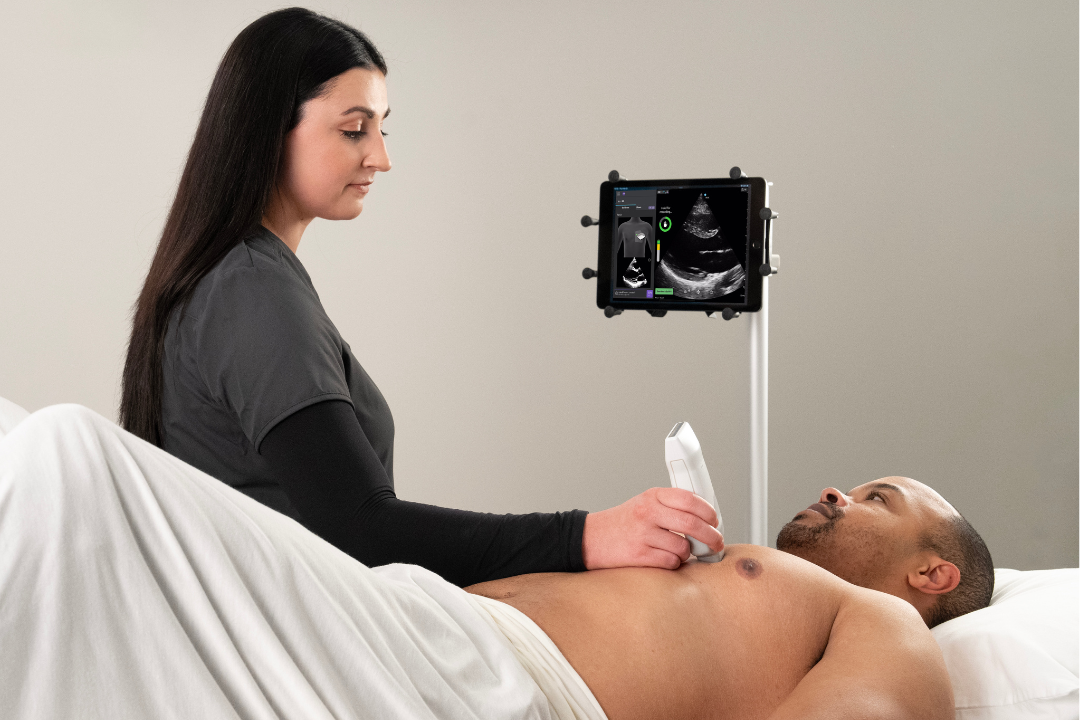AI-guided ultrasound is now a reality, transforming healthcare by democratizing access to diagnostic-quality imaging. It empowers clinicians with limited ultrasound experience to capture precise images. Combined with the rise of portable devices, AI scan guidance is expanding access to high-quality medical care for a broader range of patients.
What is AI-guided ultrasound?
Ultrasound exams depend heavily on the operator's skill and experience. Accurate and complete exams require understanding complex anatomy, optimizing the probe for each patient, and capturing enough images to meet guidelines. As a result, less experienced operators or clinicians with minimal ultrasound training may produce inadequate images or inconclusive diagnoses.
AI-powered scan guidance addresses these challenges by giving operators real-time feedback during scans. Deep learning algorithms, trained on vast ultrasound data, recognize anatomical structures and guide the user on probe positioning and adjustments. This support enables consistent, high-quality imaging, no matter the experience level of the clinician performing the scan.
“One of the biggest barriers to using ultrasound is having the right skills. But with AI-driven scan guidance - like Caption cardiac guidance on Vscan AirTM SL and VenueTM family - the user receives real-time, step-by-step feedback to maneuver the ultrasound probe, almost like GPS, leading them to the optimal image quality for clinical diagnosis. This technology reduces the skill barrier in ultrasound and truly democratizes its use for timely patient care at the bedside.” Radhika Madhavan, Global Product Manager for AI Solutions at GE HealthCare.
Turning more practitioners into expert POCUS users
Ultrasound has evolved from a specialized tool confined to imaging suites into a widely accessible modality used across diverse healthcare settings. Clinicians in emergency rooms, outpatient clinics, and primary care offices are increasingly adopting point-of-care ultrasound (POCUS) as part of their standard of care. This shift is driven by the technology's portability, speed, and ability to deliver immediate diagnostic insights, making it invaluable in time-sensitive and high-demand environments.
As POCUS utilization grows, AI-powered scan guidance supports clinicians with limited ultrasound experience to effectively utilize the modality. Improved scan accuracy can enhance the clinician's decision-making, treatment planning, and even patient transfer decisions, enabling more efficient care and better patient outcomes across various points of care.
A surge in POCUS utilization and expertise could be especially impactful in underserved or low resourced settings. The Bill & Melinda Gates Foundation is supporting the development of new, portable, and AI-enabled ultrasound devices to help drive healthy pregnancies. GE HealthCare will design this technology to run across a range of ultrasound devices and probes, including lower-cost handheld devices.
“Developing automated AI capabilities on ultrasound with a simplified user interface can enable the product to reach a broader set of health care practitioners, including nurses and midwives and help in addressing health equity by lowering the barriers to training and enabling faster exams. The foundation believes investing in and accelerating these technologies can transform health care systems,” said Ari Moskowitz, Deputy Director, Medical Devices & AI, Bill & Melinda Gates Foundation.1
Leveraging AI to improve population health and the patient journey
Effective population health management relies on identifying patients before they develop symptoms of illness. Ultrasound plays a key role, but a widespread shortage of trained sonographers means it’s not possible or practical to deploy these expert operators at every point of care.
AI-guided ultrasound is bridging a critical gap in population health management by enabling expert-level, diagnostic-quality assessment scans to be performed by the clinician closest to the patient—whether in a clinic, primary care office, or even at home.* This technology drives a significant shift from reactive to proactive care, allowing for earlier detection and timely intervention, ultimately getting more patients on the right care pathways sooner.
A prime example is earlier detection of cardiovascular disease through expanded access to AI-guided rapid cardiac assessments. Cardiovascular diseases are the leading cause of death globally, responsible for about 17.9 million deaths annually2, with over 60% of these deaths being preventable and premature.3 By enabling nurses, physician assistants, and primary care providers to perform rapid cardiac assessments, cardiac abnormalities can be detected earlier, often before symptoms appear. Data supports this approach: an analysis of 1,800 AI-guided echocardiograms on patients with cardiovascular risk factors—both symptomatic and asymptomatic—found that over 50% had cardiac abnormalities consistent with at least Stage B heart failure.4
“Our vision at GE HealthCare is to provide AI-powered ultrasound solutions that allow users of varying skill levels to acquire diagnostic quality images, rapidly perform measurements, and identify pathologies to aid their clinical decisions. We believe that this will help expand access to healthcare and provide critical information early on, allowing intervention while the disease is still in its early, more treatable stage.” said Radhika.
Learn more about AI-guided ultrasound
Caption GuidanceTM from GE HealthCare helps clinicians scan with confidence. It is designed to enable more healthcare professionals to capture high-quality cardiac images. Learn more about AI-powered scan guidance on our Venue family and Vscan Air SL ultrasound devices.
REFERENCES:
2. “Cardiovascular diseases (CVDs),” World Health Organization, last modified September 18, 2024, https://www.who.int/news-room/fact-sheets/detail/cardiovascular-diseases-(cvds).
3. M Vaduganathan et al., “The Global Burden of Cardiovascular Diseases and Risk: A Compass for Future Health”. Journal of the American College of Cardiology 80, no. 25 (2022), 2361-2371.
4. Based on the Caption Care study (Detecting Disease Earlier Value-Based Care 724-01225 R1) using Caption AI in September 2022. Actual results may vary.
Caption Guidance, Venue, Venue Go, Venue Fit, Venue Sprint and Vscan Air are trademarks of GE HealthCare.
Product and features may not be available in all countries and regions. Full product technical specification is available upon request. Contact a GE HealthCare representative for more information.
Venue family consists of Venue, Venue Go, Venue Fit, and Venue Sprint.
*per the intended use environments cleared for the device
JB31676XX

